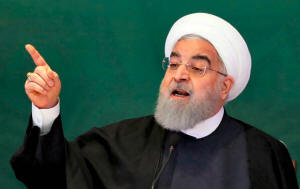|
Iran says it will fiercely resist U.S.
pressure to limit its influence
 Send a link to a friend
Send a link to a friend
 [May 07, 2018]
By Parisa Hafezi [May 07, 2018]
By Parisa Hafezi
ANKARA (Reuters) - Iranian President Hassan
Rouhani said on Monday the United States would regret any decision to
leave Iran's 2015 nuclear deal with world powers and Tehran would
fiercely resist U.S. pressure to limit its influence in the Middle East.
U.S. President Donald Trump, a long-time critic of the deal reached
between Iran and six powers in 2015 before he took office, has
threatened to pull out by not extending sanctions waivers when they
expire on May 12, unless European signatories of the accord fix what he
calls its “flaws”.
"If they want to make sure that we are not after a nuclear bomb, we have
said repeatedly that we are not and we will not be," Rouhani, who
engineered the nuclear accord to ease Iran's isolation, said in a speech
broadcast live on state television.
"But if they want to weaken Iran and limit its influence whether in the
region or globally, Iran will fiercely resist."
Under the agreement with the United States, France, Germany, Britain,
Russia and China, Iran strictly limited uranium enrichment capacity to
satisfy the powers that it could not be used to develop atomic bombs. In
exchange, Iran received relief from sanctions, most of which were
rescinded in January 2016.

Britain, France and Germany remain committed to the nuclear accord and,
in an effort to keep Washington in it, want to open talks on Iran's
ballistic missile program, its nuclear activities beyond 2025 - when key
provisions of the deal expire - and its role in the wars in Syria and
Yemen.
Iran's clerical rulers have repeatedly ruled out reducing its sway
across the region, as demanded by the United States and its European
allies. Tehran says its missile capabilities are purely defensive and
nuclear ambitions only civilian in nature.
ROUHANI UNDER PRESSURE
Any annulment of the accord could tip the balance of power in favor of
hardliners looking to constrain the relatively moderate Rouhani's
ability to open up to the West.
Rouhani said the Islamic Republic had been preparing for every possible
scenario, including a deal without the United States - which would still
include European signatories, China and Russia - or no deal at all.
"We are not worried about America's cruel decisions...We are prepared
for all scenarios and no change will occur in our lives next week," he
said. "If we can get what we want from a deal without America, then Iran
will continue to remain committed to the deal. But if not, Tehran will
continue its own path."
[to top of second column]
|

Iranian President Hassan Rouhani speaks during a meeting with
Muslim leaders and scholars in Hyderabad, India, February 15, 2018.
REUTERS/Danish Siddiqui/File Photo

Iran has warned that it would ramp up its nuclear activities if the
accord collapses to achieve a more advanced level than before 2015.
Foreign Minister Mohammad Javad Zarif warned that Tehran's "fierce
reaction to a violation of the nuclear deal with major powers will
not be pleasant for America", state TV reported.
"There has been no new agreement between Iran and the Europeans over
the deal...Iran will not be the first to violate the agreement,"
Foreign Ministry spokesman Bahram Qasemi told a weekly news
conference, TV reported.
British Foreign Secretary Boris Johnson appealed to Trump not to end
the agreement. "It has weaknesses, certainly, but I am convinced
they can be remedied," Johnson wrote in an opinion piece for the New
York Times.
"Indeed at this moment Britain is working alongside the Trump
administration and our French and German allies to ensure that they
are," said Johnson, who began a two-day visit to the United States
on Sunday.
The foreign secretary said he saw no advantage in losing the
"handcuffs" the deal imposed on Iran's nuclear aspirations and only
Tehran would benefit from exiting it.
"I believe that keeping the deal's constraints on Iran's nuclear
program will also help counter Tehran's aggressive regional
behavior. I am sure of one thing: every available alternative is
worse. The wisest course would be to improve the handcuffs rather
than break them."

(Additional reporting by Michael Holdenin London; Writing by Parisa
Hafezi; Editing by Mark Heinrich)
[© 2018 Thomson Reuters. All rights
reserved.]
Copyright 2018 Reuters. All rights reserved. This material may not be published,
broadcast, rewritten or redistributed.
Thompson Reuters is solely responsible for this content. |